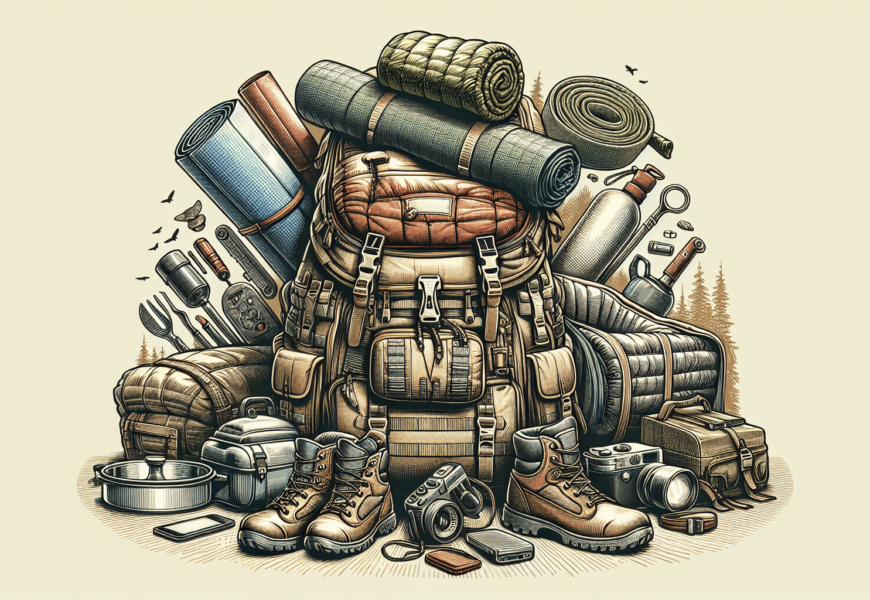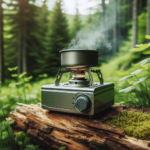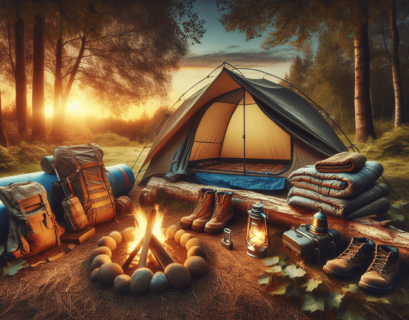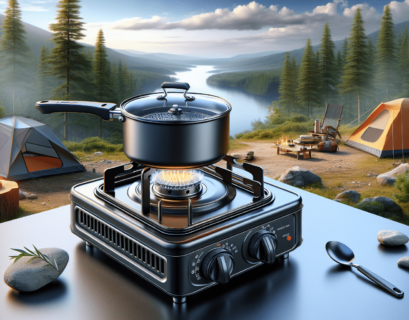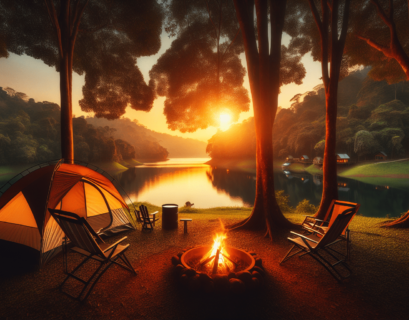Imagine yourself embarking on your very first camping trip, surrounded by nature’s beauty and pure serenity. However, in order to fully enjoy this experience, you must first conquer the art of packing. This beginner’s guide aims to assist you in preparing for your camping trip, ensuring that you have all the essentials needed for a comfortable and enjoyable outdoor adventure. From shelter to clothing to food and equipment, let’s dive into the world of packing for your upcoming camping trip with excitement and ease.
Understanding The Basics of Camping
Camping is a wonderful way to disconnect from the hustle and bustle of everyday life and immerse yourself in nature. Before you embark on your camping adventure, it’s important to understand the basics. First and foremost, familiarize yourself with the different types of camping available.
Knowing different types of camping
There are various types of camping, each offering a unique experience. You can opt for car camping, where you park your vehicle at a campsite and set up your camp nearby. If you’re feeling more adventurous, backcountry camping allows you to hike or backpack to a remote location and set up camp.
Importance of planning
Once you’ve decided on the type of camping experience you want, it’s crucial to plan ahead. Research the area where you’ll be camping and gather information about the weather, terrain, and any potential hazards. This will help you prepare and pack accordingly, ensuring a safe and enjoyable trip.
Scouting your camping location
Before heading out, scout the camping location if possible. Look for a suitable spot to set up your camp, taking into consideration factors like level ground, access to water, and proximity to restrooms or amenities. This will make the actual camping experience much smoother.
Camping Gear Essentials
Having the right camping gear is essential for a successful and comfortable trip. Here are some key essentials to consider when packing for your camping adventure.
Choosing a camping tent
Your tent will be your home away from home during the trip, so it’s important to choose one that suits your needs. Consider factors such as size, weight, and durability. If you’re camping solo, a smaller tent may be sufficient, but for larger groups or families, a spacious tent with multiple rooms may be required.
Selecting sleeping bag and pads
A good night’s sleep is crucial for an enjoyable camping experience. Invest in a quality sleeping bag that will keep you warm and comfortable throughout the night. Additionally, consider using sleeping pads or air mattresses to provide insulation and cushioning against the hard ground.
Opting for the right camping backpack
Choosing the right camping backpack is essential for carrying all your gear. Look for a backpack that is comfortable and has enough capacity to accommodate all your essentials. Consider features like adjustable straps, multiple compartments, and a sturdy frame for added support.
Importance of a headlamp or flashlight
When camping, it’s inevitable that you’ll be venturing out at night. Having a reliable headlamp or flashlight is crucial for navigating in the dark. These tools will not only help you see where you’re going but also make tasks like cooking or finding items in your tent much easier.
Camping Clothing Essentials
Packing the right clothing for your camping trip is essential for comfort and protection. Consider the following factors when selecting your camping wardrobe.
Clothing based on weather conditions
Always pack clothing appropriate for the anticipated weather conditions. Layering is key, as it allows you to adjust your clothing according to temperature fluctuations. Pack lightweight, moisture-wicking fabrics for hot weather and insulating layers for colder temperatures. Don’t forget to bring extra socks and underwear for extended trips.
Choosing the right footwear
Your choice of footwear can make or break your camping experience. Invest in sturdy, waterproof boots that provide ankle support and have good traction. This will help prevent slips and falls, especially on uneven or slippery terrain. Additionally, pack a pair of comfortable sandals or shoes for lounging around the campsite.
Importance of rain gear and extra clothing
Even if the weather forecast predicts clear skies, it’s always wise to pack rain gear. A waterproof jacket, pants, and a hat will protect you from unexpected downpours or damp conditions. Also, bring extra clothing in case your clothes get wet or dirty. This will ensure you have a dry and comfortable outfit to change into.
Guide To Camping Kitchen
Eating well while camping is not only essential for nourishment but also adds to the overall camping experience. Here’s a guide to setting up your camping kitchen.
Selection of camping stove
A camping stove is a convenient and efficient way to cook meals outdoors. Choose a stove that suits your cooking needs, whether it’s a compact backpacking stove or a larger, multi-burner stove for group camping. Check the fuel options and consider the cooking surface and heat control features.
Cookware and utensils
Pack lightweight and durable cookware and utensils that are specifically designed for camping. Consider essentials such as a pot, pan, plates, bowls, cutlery, and a camping-friendly coffee maker. Opt for materials like stainless steel or titanium, which are easy to clean and resistant to damage.
Tips for meal planning and packing food
Plan your meals in advance to ensure you have enough food for the duration of your camping trip. Choose meals that are easy to prepare and require minimal ingredients. Pack non-perishable items like canned food, dehydrated meals, and energy bars. Don’t forget to bring a cooler for perishable items and pack them securely to prevent spills or spoilage.
Hydration and Water Treatment
Staying hydrated is crucial during outdoor activities, especially camping. Here are some tips to ensure you have access to clean drinking water throughout your trip.
Carrying enough water
It’s important to carry an adequate amount of water for your camping trip, as clean water sources may not always be readily available. Calculate the amount of water you’ll need per day, accounting for cooking, drinking, and personal hygiene. If possible, bring extra water or plan to replenish your supply at nearby water sources.
Choosing a good water bottle
Invest in a durable and reusable water bottle that is suitable for outdoor use. Look for bottles with a secure cap or lid to prevent spills and leaks. Consider options with insulation to keep your water cool on hot days. Additionally, pack a collapsible water container for larger water storage needs.
Options for water treatment
If you’re unsure about the quality of available water sources, it’s wise to carry a water treatment method. This can include water purification tablets, portable water filters, or ultraviolet light sterilizers. These methods will help eliminate harmful bacteria and pathogens to ensure safe drinking water.
Camping Navigation Tools
Navigating your way through the wilderness is essential for a successful camping trip. Here are some tools that can assist you in finding your way.
Importance of a camping map
A detailed map of the camping area is a vital tool for navigation. Familiarize yourself with the map before your trip, noting landmarks, trails, and potential hazards. Use the map to plan your route and keep it handy during your journey. Remember to pack the map in a waterproof container to protect it from the elements.
Packing a compass
A compass is an essential tool for determining direction when navigating outdoors. Learn how to read a compass and practice using it before your camping trip. Having a compass on hand will help you stay on track and avoid getting lost. Consider a compass with a built-in magnifying glass for additional navigation assistance.
Guidance towards GPS and satellite messengers
For more advanced navigation and safety, consider using GPS devices or satellite messengers. GPS devices can provide accurate location details and track your progress along a trail. Satellite messengers allow you to communicate with others and send emergency signals when necessary. These tools are particularly useful for backcountry camping or when exploring unfamiliar territory.
Health And Safety Equipment
Ensuring the health and safety of yourself and your camping companions should be a top priority. Here are some essentials to include in your camping first aid kit.
First Aid Kit necessities
A well-stocked first aid kit is essential for providing immediate medical assistance in case of minor injuries or emergencies. Pack items such as band-aids, sterile gauze, adhesive tape, antiseptic ointment, pain relievers, and any necessary prescription medications. Familiarize yourself with basic first aid procedures before your trip to ensure you can handle minor medical situations.
Insect repellent and Sunscreen
Protect yourself from pesky insects and harmful sun rays by packing insect repellent and sunscreen. Mosquitoes and other insects can be a nuisance and potentially transmit diseases, so apply repellent regularly. Additionally, protect your skin from sunburn and the risk of skin cancer by using a broad-spectrum sunscreen with a high SPF rating.
Tips for food storage to avoid wildlife encounters
Proper food storage is essential to prevent unwanted encounters with wildlife. Keep your food in sealed containers or bear-resistant storage canisters, away from your sleeping area. Dispose of food scraps properly and avoid storing any scented items in your tent. Following these guidelines will help minimize the risk of attracting wildlife to your campsite.
Packing And Organizing Your Gear
Efficiently packing and organizing your camping gear is crucial for a stress-free experience. Follow these tips to ensure your gear is secure and accessible.
Ways to pack your backpack
Pack your backpack in a way that distributes weight evenly and keeps essential items easily accessible. Place heavier items like your sleeping bag and tent closer to your back for stability. Utilize compartments and packing cubes to separate and organize your gear. Pack frequently used items or emergency supplies in the exterior pockets for quick access.
How to keep your gear organized
Keeping your gear organized during your camping trip will save you time and frustration. Use storage bins or stuff sacks to categorize and separate different items. Label your containers to quickly identify their contents. Keep frequently used items within reach and store less essential items in a designated area of your campsite.
Steps to prevent gear from getting wet
No one wants to wake up to wet gear on a rainy camping morning. Invest in waterproof gear or pack a waterproof cover for your backpack to protect your belongings from moisture. Use dry bags or zip-lock bags to keep important items dry, such as electronics, clothing, or documents. Additionally, choose a suitable tent location and ensure proper rainfly setup to prevent water from seeping inside.
Preparing For A Camping Trip
Proper preparation before your camping trip will set you up for success. Follow these guidelines to ensure a safe and enjoyable adventure.
Checking weather forecast
Always check the weather forecast for your camping location before heading out. This will help you prepare for any upcoming rainstorms, extreme temperatures, or other weather conditions. Adjust your clothing, gear, and plans accordingly to ensure you’re well-prepared for the anticipated weather.
Informing someone about your trip details
It’s crucial to inform someone about your camping trip details, especially if you’re going off the grid. Share your itinerary, including the location, duration, and expected return date, with a trusted friend or family member. In case of an emergency or if you fail to return as planned, they will have valuable information to provide to authorities.
Packing extra batteries and power backup
Don’t forget to pack extra batteries for your headlamp, flashlight, lantern, and other electronic devices. Having additional power sources ensures your essential tools and communication devices are operational throughout your trip. Consider bringing portable power banks or solar chargers to recharge your devices if needed.
Handling Camping Challenges
Camping can sometimes present challenges, but with some know-how, you can overcome them confidently. Here are some tips for handling common camping challenges.
How to set up a tent
Setting up a tent may seem intimidating at first, but it’s a skill that can be easily learned. Familiarize yourself with your tent’s assembly instructions before your trip. Practice setting it up in your backyard or a nearby park before heading into the great outdoors. This will ensure a smoother and quicker setup process at the campsite.
Starting a campfire safely
Campfires are a classic camping tradition, but they require caution and responsibility. Follow the rules and regulations of the campsite regarding fires. Choose a safe location for your fire, away from flammable materials and overhanging branches. Always keep a bucket of water or a fire extinguisher nearby in case of emergencies. Extinguish the fire completely before leaving the campsite or going to sleep.
What to do if you encounter wildlife
Encountering wildlife can be an exciting experience, but it’s important to know how to handle it safely. Keep a safe distance from wild animals and never approach them. Store your food and scented items properly to prevent attracting animals to your campsite. If you encounter a bear or other potentially dangerous animals, make loud noises, wave your arms, and slowly back away. Avoid running or turning your back on the animal.
By understanding the basics of camping, packing the right gear, and being prepared for various situations, you’ll be well-equipped to embark on a memorable camping trip. Remember to respect nature, leave no trace, and enjoy the beauty of the great outdoors. Happy camping!

